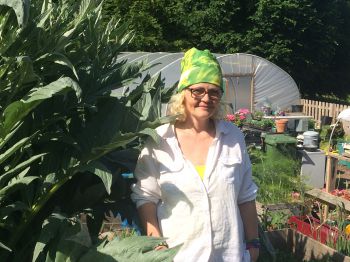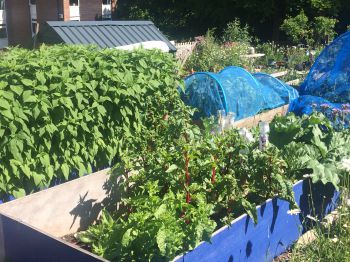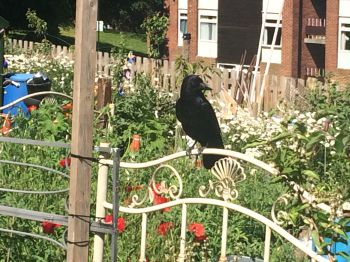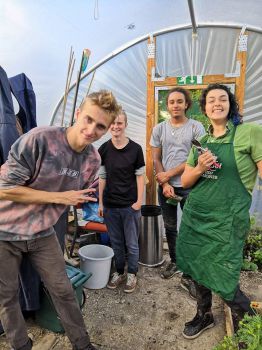A place to grow
By: Jacqui Bealing
Last updated: Thursday, 4 July 2019

Jaci Driscoll with the artichoke plant

Rich pickings

Birds are welcome

Connor Sullivan with Roots Society gardeners
A different kind of learning takes place on a patch of land at the University of Sussex campus.
Just beyond the neat lawns and the boxy brick architecture is a fenced-off area (to keep out the local rabbits) that is teeming with edible and colourful vegetation.
This is the student-run allotment, where a wildly spiky artichoke plant rubs shoulders with raised beds bursting with potatoes, leeks, onions, garlic, chard, broad beans and cauliflowers; where defunct metal filing cabinets harbour soft fruit bushes; and where an exotic kiwi fruit tree and a grape vine are entwined in iron bedsteads.
Everywhere you look, something interesting is growing, often from receptacles that once served other purposes (toilets, chimney pots, old boots). They’ll try all sorts. For two years watermelons successfully swelled in the spacious poly tunnel.
The students’ Roots Society has been going for six years and has some 50 members, with several turning up every week to water, weed, sow seeds, and harvest the crops.
They’re guided by Jaci Driscoll, a horticulturalist with a specialist knowledge in biodiversity and permaculture (no pesticides here), who works for the University’s estates team.
“Biodiversity is free,” she points out. “It doesn’t hurt the planet, and it’s good to be able to educate people about not using poison. Without the poison you will never be pest free - our watermelon plants got eaten this year - but you can try to manage them.”
She does this by encouraging wildlife (not rabbits) into the allotment. Flowering plants attract pollinators, feeders and water baths bring in birds who will eat whatever tasty bugs they might find.
The students get a lot out of the allotment – and not just a share of the home-grown organic vegetables.
“I love seeing their excited faces when we’ve created a good batch of compost,” says Jaci, “or when a seed they have planted finally sprouts.
“This also gives them a break from their studies and staring at a screen. I’m watching them making friends, and sometimes having romances.”
Roots Society organiser Connor Sullivan affirms that the allotment brings many rewards. “I’ve just finished my Zoology BSc, and now I’m really interested in the relationship between producing food and wildlife. I’ve been able to learn loads about horticulture and permaculture from Jaci.
“It’s also been nice to get away from everything else that’s going on. I love wildlife photography and the plot is a great place to practise.”
His fellow students have identified other benefits. One revealed it had helped her overcome mental health issues at the start of her course. Another said it was where she felt most at home.
Another dug deeper still. “This is about reconnecting ourselves to the land and nature we have been detached from by a logic of market-driven consumer culture that pillages the earth. This is about opening ourselves up to an entirely different – and rich – bank of knowledge and diverse ontologies.”
Food for thought, indeed.
